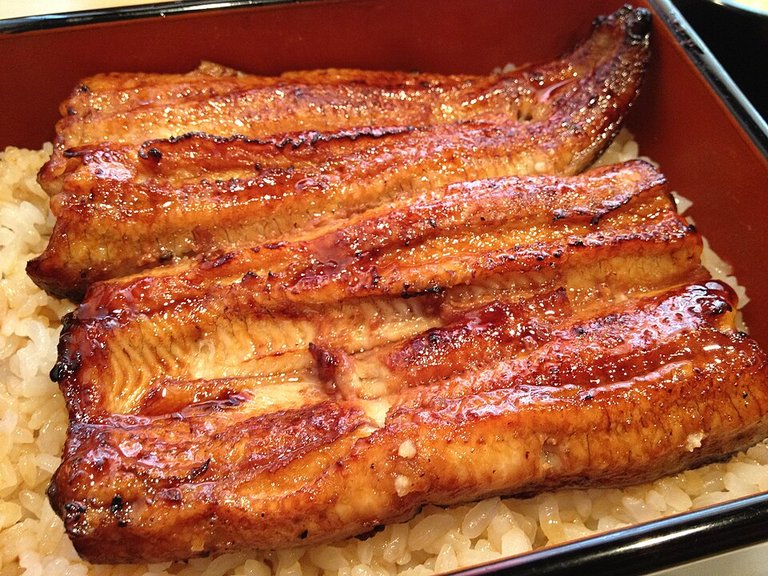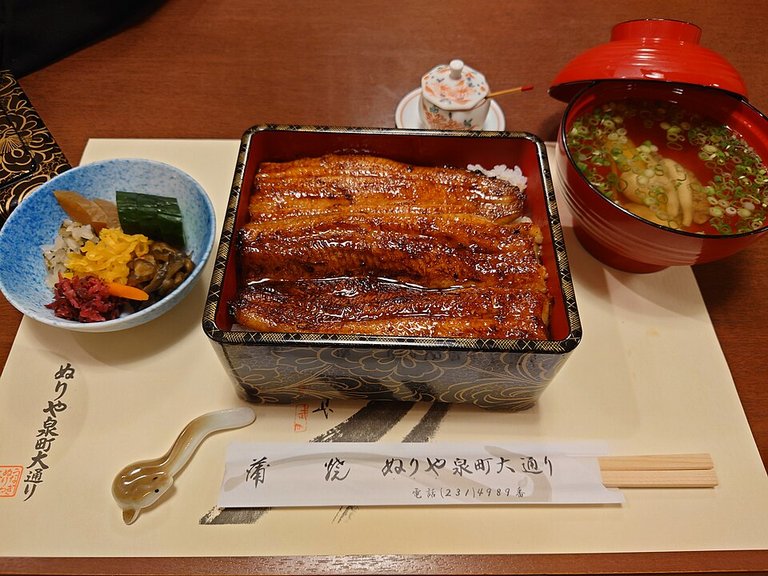Surviving Summer Fatigue (Natsubate) ~ What to Do When You Don't Want to Do Anything? Eat Unagi (Eel)!
Summer in Japan is rough. I know, it's rough everywhere. In Japan the combination of high heat and terrible humidity make it especially rough. Summers are always hot here, but the past few years it has ranged around 35-40°C (95–104°F) for the entire summer while the average humidity is 76%. This makes a sauna-like environment where as soon as you step outside of air condition, you are instantly covered with sweat that then just sticks to you.
Too many days like this in a row makes us tired and lethargic. The Japanese call this natsubate (夏ばて), "summer fatigue". From what I understand it is actually a somewhat serious condition, a precursor to heat stroke, which unfortunately has been becoming more and more common the past few years in Japan, but in daily use we often use it more casually to describe when you are just tired of being hot all the time and don't have energy to do anything.
There are a few traditional things to help with it. Watermelon, shaved ice (the Japanese shaved ice is so much better than what we call shaved ice in America), cool noodle dishes, various other things that cool down and/or hydrate the body. One of my favorite is eating unagi, "freshwater eel". Which... doesn't seem like it would cool down or hydrate the body, but yet it is considered one of the best foods for summer. Why?

via Wikipedia
For centuries, unagi has been considered the secret to surviving natsubate. As I understand it, this is mostly due to clever advertising during the Edo period (1603-1868). At the time, eel was considered a winter dish, which makes a bit more sense. But in an attempt to drum up summer business, one unagi shop owner started advertising that the best foods to eat during Ushi no Hi were foods that start with u. And unagi starts with u, making it the perfect food to eat for health! Brilliant!
Let's explain that Ushi no Hi thing.
By itself Ushi no Hi (丑の日) is the day of the ox, one of the 12 animals of the zodiac. Most of you are familiar with the animal years, but the system does go beyond that. Months are assigned to a certain animal, as well as days, and even hours.
The specific Ushi no Hi that this unagi shop owner was targeting was Doyo no Ushi no Hi (土用丑の日). Doyo refers to the 18 days before the beginning of a new season, but unless other context is given, often Doyo by itself refers to the summer Doyo, which corresponds to the dog days, the hottest part of summer. And during this time period Ushi no Hi usually falls somewhere in the period of July 18th to August 8th. Then with the context of summer we can easily shorten Doyo no Ushi no Hi to just Ushi no Hi and everyone knows what we are talking about.
So back to this Edo period Mad Men. He suggested unagi was the best u food to eat on Ushi no Hi and advertised all the health benefits it would bring, including beating natsubate. His ad campaign was an incredible success, spread like wildfire, and even today Japanese supermarkets and restaurants still make the same claims.

via Wikipedia
When places make the claim today they are more appealing to tradition than scientific fact, but there is some science basis for the claim. Unagi has protein, omega-3, vitamin E and A, calcium, and phosphorus. The omega-3 alone is said to improve blood pressure, lower cholesterol, maintain bone health, and for women relieve menstrual pain. Other health benefits suggested by the food are lower risk of some cancers and improved blood flow to the brain which may reduce the chance of dementia.
A pretty healthy food. While it may not exactly work to directly help the body get over summer heat, it's not a huge stretch to say it may help increase energy, which does seem like something that would help with natsubate. That combined with the great taste is probably why this remains such a strong tradition.

Unfortunately unagi has been overfished and is becoming rarer. The naturally caught domestic stuff costs more than most average people can afford. There is cheap farmed unagi from China, but this has a terrible and unhealthy image so most people do their best to avoid it.
Anyway, so if you feel like you have natsubate, unagi may just be the answer for you—if you can find and afford it, anyway.
❦
 |
David LaSpina is an American photographer and translator lost in Japan, trying to capture the beauty of this country one photo at a time and searching for the perfect haiku. He blogs here and at laspina.org. Write him on Twitter or Mastodon. |
You received an upvote of 83% from Precious the Silver Mermaid!
Please remember to contribute great content to the #SilverGoldStackers tag to create another Precious Gem.
Wait, you mean unagi isn't a heightened sense of awareness? Ross Gellar steered me wrong all those years!
I think Ross was high in that episode.
Isn't Anago excell more in term of Nutrition? !hiqvote
@dewabrata, the HiQ Smart Bot has recognized your request (1/2) and will start the voting trail.
In addition, @dbooster gets !WEED from @hiq.redaktion.
For further questions, check out https://hiq-hive.com or join our Discord. And don't forget to vote HiQs fucking Witness! 😻
Oh, wow. This couldn't look better and I would eat it no matter if it's winter or summer, I would make up an excuse to eat it. It looks delicious.
Greetings.
Oh it is, believe me, it is!
Cool story!
This reminds me of a story I once heard about diamonds. Apparently there are plenty of diamonds, but some bloke decided to tell everyone that they were rare, put ads on TV about giving them to your sweetheart, and next thing we know, diamonds are a girl's best friend.
I've heard that story about diamonds too. Advertise men wield great power!
Cecil Rhodes. He sure did. Ran the world back then.
At the risk of boring you, I am going to say, that eel was Nakata'a favorite food that he would dream of but can never afford because he is old, autistic man living on govt benefits....
Nakata was a famous character in Haruki Murakami's Kafka on the Shore. I don't know if you read it or even like Murakami..
but you have it, I just blurted seeing something very familiar, and yet I have never been to Japan.
https://en.wikipedia.org/wiki/Kafka_on_the_Shore
You know, I did read Kafka on the Shore, but that was about 15 years ago and I remember almost nothing of it except one of the characters loved Beethoven's Archduke Trio. I do remember enjoying it, but the overall story has just completely disappeared from my mind. I was in my Soseki phase at that point. I recall liking Botchan so much that I read it multiple times in multiple translations, trying to pick at it in the original Japanese as well. Maybe that one kind of pushed all others out.
One of these days I'm going to have to go back and read Kafka again.
You may want to read that again. In my view, and I think my view is non-unique, Kafka on the Shore is Murakami's magnum opus. I have read it many times. Everytime it feels different.
I like eel, I think it tasted great. Too bad it's becoming overfished, and anything coming out of Chinese seafood farms should be suspect due to antibiotic overuse...
Very interesting history though, thanks for sharing. Now I kind of want some shaved ice and some watermelon too...
!BBH
!DOOK
You just got DOOKed!
@thebighigg thinks your content is the shit.
They have 2/400 DOOK left to drop today.
Learn all about this shit in the toilet paper! 💩
@dbooster! @thebighigg likes your content! so I just sent 1 BBH to your account on behalf of @thebighigg. (2/50)
(html comment removed: )
)
I've never eaten eel and I think I have never seen it offered for sale here. Of course it does not sound good if your mind is picturing a wiggly, slimy creature, but I realize that is just being silly. It looks delicious though, the way the picture shows it.